裕兴新概念学习笔记第一册
裕兴新概念英语第一册笔记:Lesson 1 Excuse me
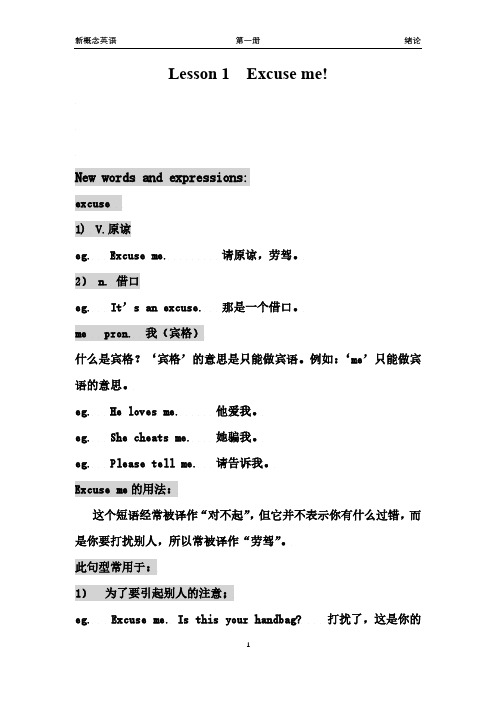
Lesson 1 Excuse me!New words and expressions:excuse1) V.原谅eg. Excuse me. 请原谅,劳驾。
2) n. 借口eg. It’s an excuse. 那是一个借口。
me pron. 我(宾格)什么是宾格?‘宾格’的意思是只能做宾语。
例如:‘me’只能做宾语的意思。
eg. He loves me. 他爱我。
eg. She cheats me. 她骗我。
eg. Please tell me. 请告诉我。
Excuse me的用法:这个短语经常被译作“对不起”,但它并不表示你有什么过错,而是你要打扰别人,所以常被译作“劳驾”。
此句型常用于:1)为了要引起别人的注意;eg. Excuse me. Is this your handbag? 打扰了,这是你的手提包吗?2)要打断某人或要打断别人的话eg. Excuse me. May I ask you a question? 打扰了,我能问你一个问题吗?3)向陌生人问路时eg. Excuse me. Could you please tell me the way to the railway station? 劳驾,请问去火车站的路怎么走啊?4)向某人借东西eg. Excuse me. Can I borrow your pen? 打扰一下,可以借你的钢笔用一下吗?5)需要从别人身边挤过或让别人给自己让路eg. Excuse me. Could you please make some room for me?劳驾,借过一下。
6)要求在宴席或会议途中离开一会儿Excuse me. May I leave for a little while? 对不起,失陪一下。
Sorry 用于你做错某事而向别人道歉的时候,表示“对不起”。
区别如下:1)请问几点了?eg. Excuse me. What time is it?2)不小心把水弄到别人身上。
裕兴[经典成人版]新概念英语笔记1~3册
![裕兴[经典成人版]新概念英语笔记1~3册](https://img.taocdn.com/s3/m/2c5435ee65ce050876321383.png)
裕兴裕兴(经典成人版)新概念英语笔记1~3册笔记完整版新概念英语第一册——学习方法与指导新概念英语第一册是针对中学生和成人初学者而设计的一本教材,其内容涉及如下几方面:一、语音二、词汇三、课文四、语法一、语音英语音标的系统讲解将在前四十课内完成。
通过对语音部分系统而全面的学习,学生要了解英语的基本发音规律及特点,掌握英语单词的读音规则及句子的发音技巧,为今后的英语学习奠定良好的语音基础。
学生首先要听清楚每个音素的发音,掌握其要领,然后认真模仿.争取把每一个音都发得准确、到位。
二、词汇新概念英语的显著特点之一就是它蕴含了丰富的词汇。
新概念第一册的单词大多比较常用,而且也都简单易懂,在授课过程中,我们又以书上的生词为基础,有针对性地对这些单词作了必要的补充。
比如同义词、反义词及这些单词的副词、形容词和名词形式等等。
学生可以运用单词联想记忆法,迅速扩充词汇,同时还可以了解一些英语的基本的构词,使单词的记忆变得更轻松。
同时我们也对一些词汇的其它常用意思和用法作了适当的补充,而且所补充的这些单词并不是孤立的,他们都附有大量的例句,1以便学生能够清楚地知以便学生能够清楚地知道运用这些词汇的具体情景,使学生在词汇的运用上把握得更准确、自如,从而达到事半功倍的效果。
三、课文新概念英语第一册不涉及写作方面的知识,也没有长篇阅读的文章。
课文多为对话,内容简单易懂,对初学者和具有初级水平的学生来说,可以轻松掌握。
课文中的语言多为生活化的语言,具有很强的实用性。
学生要充分利用课文现有的资源,首先要多听,多读,尽量地模仿它的语音语调,并最终达到学以致用。
四、语法新概念第一册将涉及到如下语法项目:1)--=> 词的单复数形式=> 助动词和情态动词的用法=> 介词短语=> there be 句型=> 定语从句=> 形容词和副词的比较级和最高级等等2)-- 时态=> 现在进行时=> 一般现在时=> 一般过去时=> 过去进行时=> 现在完成时2=> 过去完成时和将来时作为英语的学习者,要准确地掌握语法规则才能准确地把握句子结构。
裕兴新概念第一册笔记

裕兴新概念第一册笔记(15-17)(总16页)-CAL-FENGHAI.-(YICAI)-Company One1-CAL-本页仅作为文档封面,使用请直接删除Lesson 15 Your passports, please. 你的护照. 请. 语音辅音根据发音部位或发音方法的不同分为:爆破音: [p] [b] [t] [d] [k] [g]摩擦音: [f] [v] [θ] [ ð ] [s] [z] [ʃ] [ʒ] [h] [r][f] [v]f oot v estli f e fi v ef ly v aluef ast v ase[θ] [ð]th ird th oughwor th th isbrea th th atclo th wor th yth ank th ese[s] [z]fa c e no s es ue z ooloo s e lo s es et z edpa ss va s eeg: Your nose is on your face.Sue is in the zoo.[θ] [S]th ank s ankth umb s umpa th pa ssmou th mou s eth ick s ick[ʃ] [ʒ]sh ip plea su refi sh mea su reeg. It's a pleasure to visit your ship.The fish is so big and let's measure it.[h] hill/head/hit/hat/horse/house [r] rest/rug/rat/read/roadNew Words and expressions 生词和短语customs n. 海关officer n. 官员girl n. 女孩,姑娘Danish adj.& n. 丹麦的&丹麦人Denmark n. 丹麦friend n. 朋友Norwegian adj. & n. 挪威的&挪威人Norway n. 挪威Passport n. 护照( pass通过,port港口,通过港口通过港口要出示护照)brown adj. 棕色的tourist n. 旅游者customs n. 海关customs duty 海关关税office n. 办公室in the office 在办公室里customs officer 海关官员girl n. 女孩eg. That girl is my daughter.Three girlsboy n. 男孩eg. The boy is her son.The two boys are her sons.Danish n. 丹麦人(国籍);丹麦语 adj. 丹麦的Denmark n. 丹麦(国名)eg. We are Danish.My friend is Danish.My friends are Danish.Is his friend Danish Yes, he is.Are their parents Danish No, they aren't friend n. 朋友eg. Are they your friendsThey are not your friends.friendly adj. 友好的be friendly to sb 对...友好eg. She is friendly to me. 她对我很好. Norwegian n. 挪威人(国籍) ;挪威语 adj. 挪威的Norway n. 挪威(国名)eg. I am from Norway.eg. I am Norwegian.passport n. 护照eg. Her passport is green; mine is brown.Their passports are red.brown adj. 棕色的brown hair 棕色头发tourist n. 旅行者eg. Is she a touristYes, she is.No, she isn'tAre they touristsYes, they areNo, they aren'tGrammar 语法 ---Plural form名词分为可数名词和不可数名词可数名词:officer 官员friend 朋友passport 护照case 箱子umbrella 雨伞不可数名词:water 水tea 茶air 空气coffee 咖啡powder 粉末可数名词分为单数形式和复数形式单数形式: 数量为一的事物a case an egg复数形式: 数量为一个以上的事物 a bus busesa friend friendsa case cases单数变复数的变化规则主要有以下几种:1. 在单数名词后面加"s"an officer officersa tourist touristsa passport passports2. 在以"s" "x" "sh" "ch" 结尾的单数名词变复数时,需在单词后面加"es"a bus busesa dress dressesa box boxesa fox foxesa fish fishesa wish wishesa watch watchesa match watches3. 以元音字母加"y" 结尾的单数名词变复数, 我们在词尾加sa boy boysa toy toysa key keys以辅音字母加"y" 结尾的单数名词变复数, 需把y去掉再加ies.a fly fliesa baby babiesa country countries4. 以o结尾的单数名词变复数时有两种形式,其一是直接在词尾加s; 另一种是在词尾加es.口诀: 黑人英雄爱吃土豆西红柿+esNegro Negroeshero heroespotato potatoestomato tomatoes其他则加 sphoto photosradio radioa man mena goose geesea foot feeta tooth teetha sheep sheep以f或fe结尾的单数名词变成复数,一般把f或fe变成v再加es.a wife wivesa knife knives名词复数的发音规则: 清清浊浊1. 如果名词词尾的发音是一个清辅音那么词尾加的s就发[s]的音.book booksmap mapsmouth mouths以清辅音t结尾的单词,变复数加s的时候,t 与s 共同发[ts].cat catsshirt shirtsskirt skirts2. 如果名词词尾的发音是一个浊辅音或者是词尾是一个元音,那么词尾加的s就发[z]的音.tie tiesdog dogspen pensdoctor doctors以浊辅音d结尾的单词,变复数加s的时候,d 与s 共同发[dz]. bed bedskid kidsfood foods3. 如果名词词尾的发音是:[s] /[z] /[ʃ]/ [ʒ]/[tʃ]/ [dʒ] 词尾加的s 或es 发[iz]dress dressesnose noseswatch watchesfish fishesTEXT 课文Your passports, please.Is there a problem with the Customs officer No, that's fine.海关官员有什么疑问吗不, 没有了.CUSTOMS OFFICER: Are you Swedish海关官员:你们是瑞典人吗GIRLS: No, we are not. We are Danish.姑娘们:不,我们不是瑞典人。
裕兴新概念学习笔记 第一册
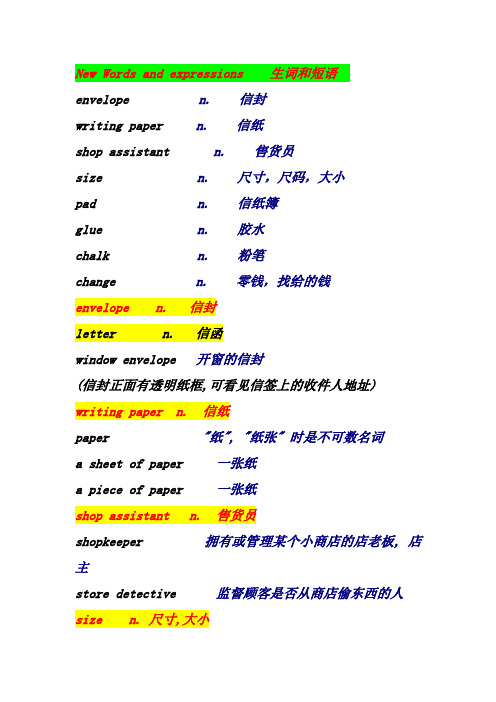
New Words and expressions 生词和短语envelope n. 信封writing paper n. 信纸shop assistant n. 售货员size n. 尺寸,尺码,大小pad n. 信纸簿glue n. 胶水chalk n. 粉笔change n. 零钱,找给的钱envelope n. 信封letter n. 信函window envelope 开窗的信封(信封正面有透明纸框,可看见信签上的收件人地址) writing paper n. 信纸paper "纸", "纸张" 时是不可数名词a sheet of paper 一张纸a piece of paper 一张纸shop assistant n. 售货员shopkeeper 拥有或管理某个小商店的店老板, 店主store detective 监督顾客是否从商店偷东西的人size n. 尺寸,大小1. 尺码,号 (衣服、鞋、帽等的)eg. What size does she want ?What size do you wear?This blouse is your size.这件衬衣是你的尺码.2. 大小(尺寸,体积,规模,身体等的), 多少(数量) eg. There are house of all sizes in that town.那个镇子有大大小小各式房子.pad n. 信签簿(指可一张张扯用的本子)glue n. 胶水(不可数名词)eg. I want some glue.---- Do you have any glue?---- No,I don'tchalk n. 粉笔coloured chalk 彩色粉笔change1. n. 找头; 零钱eg. Here is your change.这是你的找头.I have no change.我身上没有零钱.2. 变化;转换eg. There is a big change in his mind.他的思想有很大的变化.3. v. 改变eg. She never changes her mind.她从不改变主意.TEXT 课文Question: Does the lady buy any chalk?Listen to the tape then answer this question.听录音,然后回答问题。
新概念第一册笔记裕兴版新概念第一册
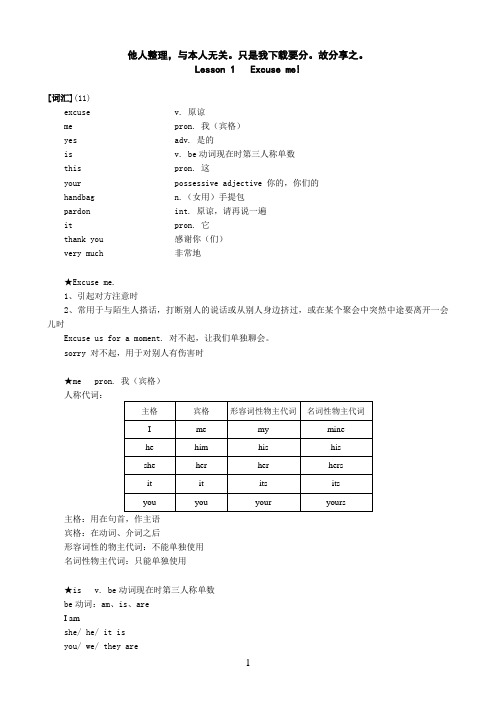
他人整理,与本人无关。
只是我下载要分。
故分享之。
Lesson 1 Excuse meexcuse v. 原谅me pron. 我(宾格)yes adv. 是的is v. be动词现在时第三人称单数this pron. 这your possessive adjective 你的,你们的handbag n.(女用)手提包pardon int. 原谅,请再说一遍it pron. 它thank you 感谢你(们)very much 非常地★Excuse me.1、引起对方注意时2、常用于与陌生人搭话,打断别人的说话或从别人身边挤过,或在某个聚会中突然中途要离开一会儿时Excuse us for a moment. 对不起,让我们单独聊会。
sorry 对不起,用于对别人有伤害时★me pron. 我(宾格)人称代词:主格:用在句首,作主语宾格:在动词、介词之后形容词性的物主代词:不能单独使用名词性物主代词:只能单独使用★is v. be动词现在时第三人称单数be动词:am、is、areI amshe/ he/ it isyou/ we/ they are★pardon int. 原谅,请再说一遍Pardon?/ I beg your pardon. 请求对方把刚才讲过的话重复一遍。
[语法]含有be动词的陈述句、否定句和一般疑问句含有be动词的任何句子,否定句就是在be动词后面加not;如果变一般疑问句,就把be动词提前到句子的前面。
[课文]Excuse me.Yes?Is this your handbag?Pardon?Is this your handbag?Yes, it is.Thank you very much.Lesson 2 Is this your…?[词汇](10)pen n.钢笔pencil n.铅笔book n.书watch n.手表coat n.上衣,外衣dress n.连衣裙skirt n.裙子shirt n.衬衣car n.小汽车house n.房子★dress① n. 连衣裙;套裙②n. 服装,衣服casual dress 便服evening dress 晚礼服★house n.房子house 房子,一般指独立的院落,更具体的指房子的建筑,结构family 侧重家庭的成员There are four people in my family. 在我家里有四口人。
[英语学习]裕兴新概念第一册学习笔记
![[英语学习]裕兴新概念第一册学习笔记](https://img.taocdn.com/s3/m/f8926fd8bb68a98270fefa44.png)
Lesson 117 Tommy's breakfast 汤米的早餐New Words and expressions 生词和短语dinning room(hall) 饭厅coin n. 硬币mouth n. 嘴swallow v. 吞下later adv. 后来toilet n. 厕所,盥洗室dinning room 饭厅,餐室(家中的)dinning 餐厅,餐厨用品dinning table 餐桌dinning car 餐车coin n. 硬币a silver coin 银币toss a coin 抛硬币(打赌正面和反面)eg. Could you change the one-dollar bill for coins?我用1美元纸钞和你换硬币好吗?Pay a person bake in his own coin.以其人之道还治其人之身.mouth n. 嘴eg. Open your mouth.张开你的嘴.-Don’t talk with your mouth full!-嘴里塞满食物时不要说话!Shut your mouth!(口语)闭嘴It sounds funny in your mouth.这种话由你的口中说出来,听起来就很可笑。
by word of mouth 口头上from hand to mouth 勉强糊口from mouth to mouth 口口相传have a big mouth 大嘴巴,嘴不严swallow1) v. 吞…, 咽…eg. He swallowed (up) the medicine with water.他把药和水一起吞下1) n. 一口(一口的量)take a swallow of beer 喝一口啤酒at one swallow 一饮而尽★ swallow v. 吞下① v. 吞下,咽下Tommy had swallowed the coins.汤米已经吞下了那硬币.②v. 抑制,使不流露I tried hard to swallow my doubts.我强忍着不露出怀疑的神色。
裕兴新概念英语第一册笔记(完整版)
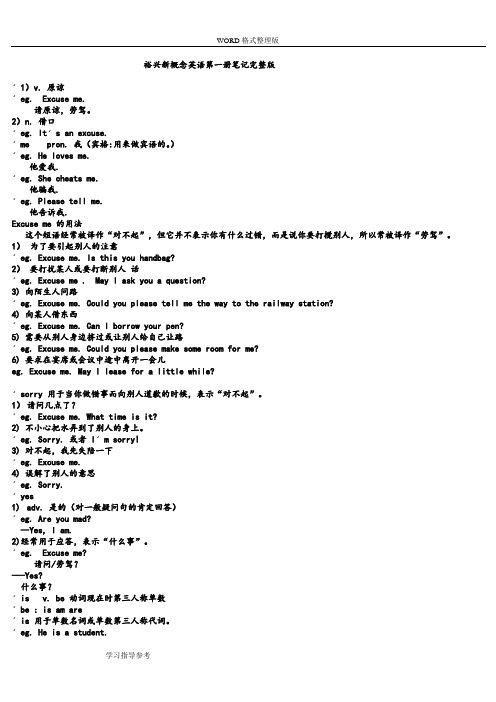
裕兴新概念英语第一册笔记完整版΄1)v. 原谅΄eg. Excuse me.请原谅,劳驾。
2)n. 借口΄eg. It΄s an excuse.΄me pron. 我(宾格:用来做宾语的。
)΄eg. He loves me.他爱我.΄eg. She cheats me.他骗我.΄eg. Please tell me.他告诉我.Excuse me 的用法这个短语经常被译作“对不起”,但它并不表示你有什么过错,而是说你要打搅别人,所以常被译作“劳驾”。
1)为了要引起别人的注意΄eg. Excuse me. Is this you handbag?2)要打扰某人或要打断别人话΄eg. Excuse me . May I ask you a question?3) 向陌生人问路΄eg. Excuse me. Could you please tell me the way to the railway station?4) 向某人借东西΄eg. Excuse me. Can I borrow your pen?5) 需要从别人身边挤过或让别人给自己让路΄eg. Excuse me. Could you please make some room for me?6) 要求在宴席或会议中途中离开一会儿eg. Excuse me. May I lease for a little while?΄sorry 用于当你做错事而向别人道歉的时候,表示“对不起”。
1)请问几点了?΄eg. Excuse me. What time is it?2) 不小心把水弄到了别人的身上。
΄eg. Sorry. 或者 I΄m sorry!3) 对不起,我先失陪一下΄eg. Excuse me.4) 误解了别人的意思΄eg. Sorry.΄yes1)adv. 是的(对一般疑问句的肯定回答)΄eg. Are you mad?--Yes, I am.2)经常用于应答,表示“什么事”。
裕兴新概念第一册学习笔记
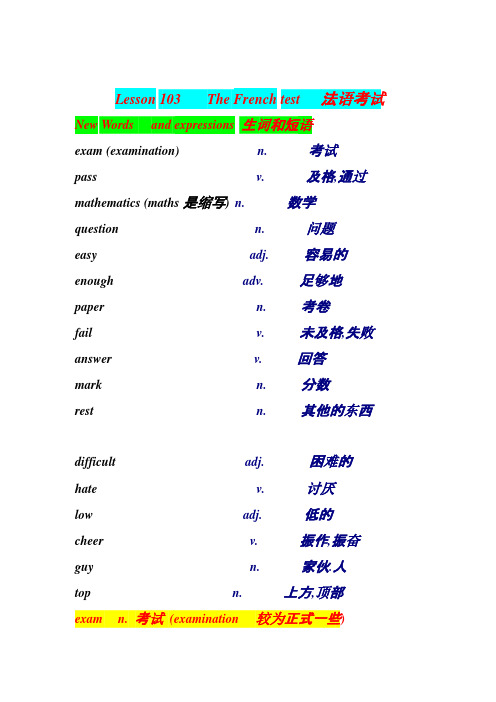
Lesson103The French test法语考试New Words and expressions生词和短语exam(examination)n.考试pass v.及格,通过mathematics(maths是缩写)n.数学question n.问题easy adj.容易的enough adv.足够地paper n.考卷fail v.未及格,失败answer v.回答mark n.分数rest n.其他的东西difficult adj.困难的hate v.讨厌low adj.低的cheer v.振作,振奋guy n.家伙.人top n.上方,顶部exam n.考试(examination较为正式一些)eg.He is a good student.He usually gots over80points in any exam.他是个好学生,他任何考试通常都在80分以上.an entrance exam/an entrance examination入学考试a midterm exam/a midterm examination期中考试a final exam/a final examination期末考试take an exam/take an examination参加考试pass an exam/pass an examination考试及格/通过考试fail an exam/fail an examination考试不及格exam/cheat in an examination考试作弊test(专项技能的)考试driving test驾照考试pass1)v.及格.通过eg.Only ten students passed the examination.只有十名学生通过了考试.pass in+具体学科pass in mathematics通过数学考试pass in Chinese通过语文考试2)通过,前进eg.The road is only wide enough for cars to pass.这条路宽度只够小汽车通过.3)穿过,越过eg.Every day I see him.He always passes me with a nod.每天我看到他,他都点个头和我擦肩而过.4)把....递给....(接双宾语)pass sb sth=pass sth to sbeg.Please pass him the paper./Please pass the paper to him.请把这张纸传给他.Will you pass the key?请把钥匙递给我好吗?5) ...消灭,结束e on!You'll be fine.The sorrow will pass.好了,你会没事的,悲伤会过去的. mathematics n.数字(maths是缩写)eg.She is poor at mathematics.她数学不太好.eg.Are you good at mathematics?你数学好吗?eg.I passed in mathmatics.我通过了数学考试.question1)n.问题(反义词为answer)question and answer/questions and answers问题和解答eg.May I ask you a question?我能问你个问题吗?I can't answer the last two questions.最后两个问题我回答不上来.beside the question远离本题的,离题的,不相关的beyond question毫无疑问eg.He is beyond question the best student in this class.他确实是这个班最好的学生.out of the question根本不可能eg.It is out of the question to make him help us.让他帮助我们是不可能的.3)v.询问,审问eg.I'll question him about what he was doing yesterday.我想问他昨天做了些什么.4)v.怀疑,对...提出异议eg.I question his honesty.我怀疑他是否诚实.easy adj.1)adj.简单的,容易的反义词为difficulteg.This is an easy question.这是个简单的问题.This is an easy job.这是件简单的工作.easy to do容易做...eg.The task is easy to do.这个工作容易做.It's easy for sb to do....对某人来说做某事很容易eg.It is easy for him to learn English.对他来说,学习英文很容易.eg.It is not easy for her grandfather to lift the box.对她的爷爷来说,把这个箱子抬起来真不容易.2)安逸的,舒适的,不用操心的lead an easy life过安逸的生活eg.Make yourself easy请放心.3)宽大的,温顺的,不严厉的be easy on sb/be easy with sb对...宽容,不严厉eg.Why are you so easy on her?你为什么那么宽容她?4)短语eg.I'm easy.随便,哪个都行.(口)Easy does it!别急!慢慢来!(口)Take it easy!放心好了,别着急,(口)enough1)adv.足够地eg.He runs fast enough to catch up with his friend.他跑得够快,能够赶上他的朋友.eg.Are you warm enough in such a light coat?你穿那么薄的衣服暖和吗?enough for sb to do足够做eg.This room is big enough for us to live in.这个房间我们住足够大了.You are not old enough to do it.你还太小,不能做这件事情.2)adj.充足的eg.Do you have enough time to do it?你有时间做这件事吗?Do you have enough chairs for everyone?你有足够的椅子给每个人吗?Ten pieces of paper are enough.十张纸足够了.enough + n. + (for sb) + to do足够(某人)做...的eg.Do you have enough money to lean me five dollars?你有没有足够的钱,借我5美元.There is enough food for us to last a week.食物足够我们维持一周的了.paper1)n.考卷(可数名词)eg.Fifty papers are not enough for the students to take the exam.五十份考卷不够学生考试.a mathemations paper一份数学试卷2)n.报纸(可数名词)相当于newspapera daily paper日报an evening paper晚报eg.That will certainly get into the papers.那一定会上报的.3)论文,报告(可数名词)4)文件,资料(常用复数形式papers)important papers重要的文件contract papers契约文件5)纸(不可数名词)a piece of paper/a sheet of paper一张纸three pieces of paper三张纸fail1)v.未及格(反义词pass)fail the exam考试不及格fail mathematics数学不及格2)v.失败(反义词succeed )eg.They failed.他们失败了.The plan failed.计划失败了.3) fail to do....未能做成某事eg.I failed to pass the exam.我没有通过考试.I failed to see him this afternoon.今天下午我未能见到他.Never fail to write to me.别忘记写信给我.answer1)v.回答eg.He doesn't want to answer me.他不想回答我.2) v.应答,回应eg.Please answer the phone.answer the door应门answer the letter回信3)n.答案eg.Do you know the answer to this question?你知道这道题的答案吗?mark1)n.分数(可数名词)school marks学校的成绩get a high mark in English英语得到高分get 80 marks in mathematics数学得了80分2)n.记号,印,标记rest1) n.其他的东西eg.You can eat up the rest of the bread.你可以把剩下的面包吃光.You open the door and window.I'll do the rest.你打开门和窗户,剩下的由我来做.eg.The rest of the money was put on the shelf.剩下的钱放在了架子上.The rest of the students went back home.剩下的学生回家了.2)n.休息take a rest/have a rest休息一下difficult1)adj.困难的(反义词easy)difficult to do....做...是困难的eg.The question is difficult to answer.该问题很难回答.It's difficult for sb to do...对某人来说做某事很难eg.It is difficult for her to type a letter.打一封信对她来说很困难.2)难对付的eg.He is a difficult man to get along with.他是一个很难相处的人.hate v.讨厌eg.I hate dogs.我讨厌狗.eg.They hate each other.他们互相厌恶.hate doing....不喜欢做...eg.She hates cooking.她不喜欢做饭.They hate typing these letters.他们讨厌打这些信.hate to do...不愿意...,不想做...eg.I hate to say it,but you are mistaken.我很不想说这句话,但你的确错了. low adj.1)低的a low wall矮墙a low roof低屋顶eg.Be careful!It's a low door.小心,门很矮.a low price低价格a low temperature低温at a low speed以低速度运行2)(身体)弱的,没有精神的,意志消沉的eg.He is in a low state of health.他的健康状态不好.eg.He is low with a cold.他因感冒而没精神.I feel so low today.我今天心情很坏.3)(声音)低的in a low voice小声地low season淡季high season旺季cheer v.1)振作,振奋eg.The news cheered the family.那个消息使那家人振奋不已.cheer up!打起精神.2)欢呼,喝彩,声援(某人),为(某人)加油,打气eg.The crowd cheered when he appeared.当他出现时群众发出欢呼声.guy n.家伙,人复数为guyseg.He's a nice guy.他是个好人.top n.上方,顶部反义词是bottomat the top of a mountain在山顶the top of the page书页的上方from top to toe从头到脚,完全地on top of the world非常幸福的,欢天喜地的. TEXT课文Question:How long did the exam last?Listen to the tape then answer this question.听录音,然后回答问题。
- 1、下载文档前请自行甄别文档内容的完整性,平台不提供额外的编辑、内容补充、找答案等附加服务。
- 2、"仅部分预览"的文档,不可在线预览部分如存在完整性等问题,可反馈申请退款(可完整预览的文档不适用该条件!)。
- 3、如文档侵犯您的权益,请联系客服反馈,我们会尽快为您处理(人工客服工作时间:9:00-18:30)。
Lesson 29 Come in, Amy. 进来,艾米。
语音-----语调1. 在英语中最主要的升调和降调.陈述句和以wh-开头的特殊疑问句用降调,即在句子的最后一个重读音节语调下降. eg. This is a good picture.He's never been there.Sue likes the film.What's the matter?How much is the map?Where did you go yesterday?Why are you late?2. 需要用yes或no 回答的一般疑问句用升调,即在最后一个重读音节语调上升.eg. May I try?Has john put on weight?Do you like sweet things?Do you want to have a smoke?3. 在选择问句中, or之前用升调, or之后用降调.eg. Shall we go on Friday or Saturday?Would you like to have the red one or the blue one?Can I keep the books for one week or two weeks? New Words and expressions 生词和短语shut v. 关门bedroom n. 卧室untidy adj. 乱,不整齐must modal verb 必须,应该open v. 打开air v. 使…通风,换换空气put v. 放置clothes n. 衣服wardrobe n. 大衣柜dust v. 掸掉灰尘土mop n. 拖把sweep v. 扫shut v. 关门close v. 关shut the door/ close the door 关上门shut the window /close the window 关上窗户shut up! 闭嘴bedroom n. 卧室living room n. 客厅= sitting room kitchen n. 厨房toliet n. 厕所dining room n. 餐厅study n. 书房balcony n. 阳台basement n. 地下室bathroom n. 卫生局,洗澡间untity adj. 乱, 不整齐un 前缀具有否定意思tidy 整齐的untidy 乱,不整齐happy 快乐的, 幸福的unhappy 不快乐的,不高兴的fair 公平的unfair 不公平的fortunately 幸运地fortune 运气/fortunate 幸运的unfortunately 不幸运地must modal verb 必须,应该情态动词can 能够,会should 应该may 可以,可能情态动词没有人称和数的变化,含有情态动词的句子,其否定句是在情态动词后面加not, 疑问句是把情态动词提前.eg. You must shut the door.你必须关门.He must open the window.他必须打开窗户.They must look at the blackboard.他们必须看黑板.We must go to school.他们必须去上学.否定句是在must后面加not.must not = mustn't 决不能,决不可以eg. She must not open the window.她决对不可以开窗户.You must not play with fire.你们千万不要玩笑.They mustn't watch TV.他们不可以看电视.She mustn't go out.她不可以出去.疑问句是把must 前提,肯定回答: Yes, 主+ must.是的,必须否定回答: No, 主+needn't不,不必了-----Must we go to school?我们必须去上学吗?Yes, you must.是的,必须Must they clean the room?你们必须打扫房间吗?No, they needn't.不,不必了.Must we copy these letters?我们必须抄这些信件吗?No, you needn't不,不必了.Must she answer the question?她必须回答这个问题吗?Yes, she must.是的,必须.No, she needn't不,不必了.open adj. 开着的反义词shut或closeopen minded: 开明的,愿意考虑不同意见和想法的eg. My mother is open-minded.我的妈妈思想很开明.open v. 打开open your mouth 张开你的嘴opening time: 开放时间,营业时间air1. v. 使...通风,换换空气air the room 给房间通风1.n. 空气(不可数名词)eg. Let's go out and breathe some fresh air.咱们出去呼吸一些新鲜空气吧!air bed 气垫air mattress 充气床垫air-conditioner 空调put v. 放置put sth +介词短语把...放在... 地方eg. Put your coat on the chair.把你的外套放在椅子上.Put these boxes on the floor.把这些箱子放在地板上.clothes n. 衣服clothes hanger 衣服挂clothes horse 晾衣架(室内) clothes line 晾衣绳clothes peg (Br) 衣架clothes pin (Am) 衣架clothes tree 衣帽架,放衣架wardrobe n. 大衣柜eg. There are some clothes in the wardrobe.有一些衣服在衣柜里.Put these boxes on the floor.把这些箱子放在地板上.dust1. v. 弹掉灰尘dust the dressing table.弹掉梳妆台上的灰尘.2. n. 灰尘(不可数名词)eg. There is some dust on the desk.在书桌上面有些灰尘.sweep v. 扫sweep the floor 扫地TEXT 课文Listen to the text and answer the question:What must Amy do to clean the room?艾米应该做什么来整理房间呢?How must Amy clean the floor? Sweep it.艾米需要如何来清扫地面?扫地MRS. JONES: Come in, Amy.琼斯夫人:进来,艾米。
MRS. JONES: Shut the door, please.琼斯夫人:请把门关上。
MRS. JONES: This bedroom's very untidy.琼斯夫人:这卧室太不整洁了。
MAY: What must I do, Mrs. Jones?艾米:我应该做些什么呢,琼斯夫人?MRS. JONES: Open the window and air the room.琼斯夫人:打开窗子,给房间通通风。
MRS. JONES: Then put these clothes in the wardrobe. 琼斯夫人:然后把这些衣服放进衣橱里去。
MRS. JONES: Then make the bed.琼斯夫人:再把床整理一下。
MRS. JONES: Dust the dressing table.琼斯夫人:掸掉梳妆台上的灰尘。
MRS. JONES: Then sweep the floor.琼斯夫人:然后扫扫地。
课文讲解:A: Come in, Amy.进来,艾米。
A: Shut the door, please.请把门关上。
这是一句祈使句,祈使句一般省略主语"you", 动词要用原形. 祈使句用来表示直接的命令,建议,告诫或邀请等多种意思.eg. Give me some glasses, please.请给我一些玻璃杯.Shut the door.关门Go and buy some new clothes.去买些新衣服.A: Come in, Amy. 进来, Amy. (祈使句)A: Shut the door, please. 请把门关上。
(祈使句)祈使句的否定句就是在祈使句前面加个"don't"eg. Don't open the door!别开门!Don't shut the window!别关窗!Don't give me this magazine.不要给我这本杂志.Don't put your dress on the bed.不要把你的连衣裙放在床上.否定句: Don’t shut the door, please! 请别关门.A: This bedroom's very untidy. bedroom’s=bedroom is 这卧室太不整洁了。
B: What must I do, Mrs. Jones?我必须做些什么呢. 琼斯夫人?这句话即有情态动词must, 又有实意动词do. 实意动词是指有实在意义的动词, 如: eat (吃), drink (喝) .含有系动词be的特殊疑问句的结构;特殊疑问词+be+主语含有实义动词的特殊疑问句的结构:特殊疑问句+助动词或情态动词+主语+谓语eg. What must I do? 我应该做什么?what:特殊疑问句must: 情态动词I : 主语do:谓语eg. What must he do?他应该做什么?What must they do?他们必须做什么?A: Open the window and air the room.打开窗子,给房间通通风。
( 祈使句,省略了主语you.) A: Then put these clothes in the wardrobe.然后把这些衣服放进衣橱里去。
then 表示"然后"eg. Eat some bread, then drink some water.吃些面包,然后喝些水.put sth +介词短语eg. Put the trousers on the bed.把裤子放在床上.A: Then make the bed.再把床整理一下。
